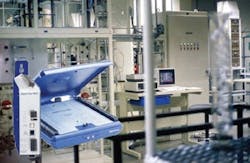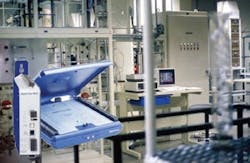Environmental Monitoring in Pharma Labs
Universal input dataloggers can record and store temperature readings from thermocouples, thermistors, RTDs and many other kinds of sensors.
Monitoring temperature and/or humidity in a pharmaceutical laboratory? Data loggers are a technology that offers a viable way to automate environmental measurement. Finding the best data loggers to monitor samples and/or equipment in the laboratory application has its challenges, and many are new to data logging and may not be sure which technology and manufacturer to choose. If specifying a monitoring solution is in your near future, consider the following Pharma Environmental Monitoring FAQs, which may help find the right logger for a given application:Q: Which data loggers are designed for lab use?
A: Data loggers can measure nearly any physical or electrical value, so they’re used in many laboratory applications, whether to record data from experiments or to handle measurement of the required temp and humidity for equipment such as refrigerators and freezers, incubators, climate chambers, autoclaves, etc. While there are many different manufacturers and models, one can narrow down his or her search with a few questions about the product, equipment to be monitored and its location.
Q: I don’t know what sensor types I’ll be using — which loggers are flexible?
A: When this is the case, or when multiple sensor types are being used, it’s often more cost-effective to use a datalogger with universal analog inputs, which can connect with many different sensor types. Universal input dataloggers can record and store temperature readings from thermocouples, thermistors, RTDs and many other kinds of sensors.
Q: I know which sensor type I need — which data logger connects to it?
A: If the sensor type to be deployed is known beforehand, that will quickly narrow down any search. For example, many data loggers are designed to record data from thermocouples, significantly lowering your cost, while others can connect to a broader range of temperature sensors such as RTDs and thermistors.
Q: What type of data logger can I get at my price range?
A: Nowadays data loggers are available in a wide variety of models from many different manufacturers. CAS Dataloggers offers temperature data loggers from $20 for most applications, including ECCS I-Plug+ BIO dataloggers, which provide an inexpensive, easy-to-use solution for stand-alone data recording of temperature in lab and life science applications. Their small footprint and low temperature range make them perfect for laboratory and life science monitoring applications. Applications such as biorepository storage or cleanroom monitoring demand more sophisticated systems with the advanced functionality to protect valuable products and specimens.
Q: Should I go with a wireless or wired logger?
A: The answer depends on several factors including a given facility’s network, the physical layout and resultant wireless range, and where the datalogger is to be installed.
The wireless technology available from suppliers, including CAS Dataloggers, automatically sends data to secure cloud servers. Operations staff can view data and alarms any time from a mobile device. Cloud Storage offers:
• Completely Automated Operation
• Online Access for Multiple Users
• Logs, Graphs, Charts
• Secure Data Storage
• Local and Remote Alarms
• Product Protection 24/7
Q: How can we prove compliance with our specific regulations?
A: Dataloggers perform continual monitoring, alarming and electronic documentation to aid with compliance and best practices in the pharma industry. If you need to record and archive data for FDA, other compliance reporting monitoring solutions are available.
Q: Where will alarms be sent?
A: For many callers with temperature-sensitive products, alarm capability is the most important factor to consider. When storage units have a temperature excursion, operators likely want a device that shows its alarm state by an audible alert, or perhaps sent by email directly to one’s mobile device to alert the fault after hours or on the weekend.
Using a wireless data logger, operators can view data online from any web-enabled device — desktop, laptop or smartphone. It’s easy to check the condition of valuable products no matter where one is. There are devices that can send out SMS text messages, emails, and even sequentially dialed voice messages as well as the ability to design custom callout lists.

